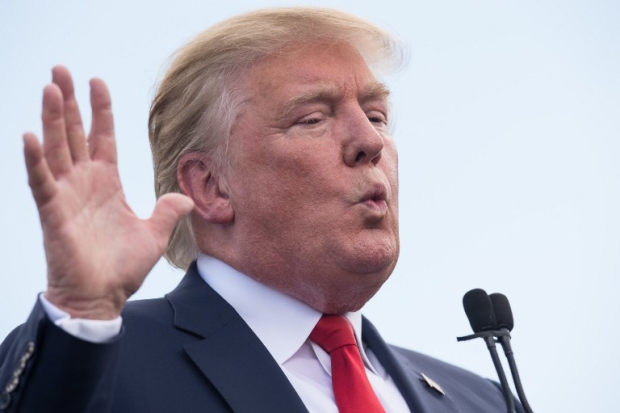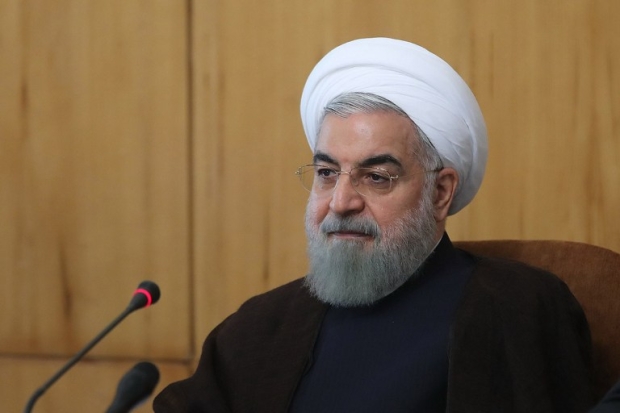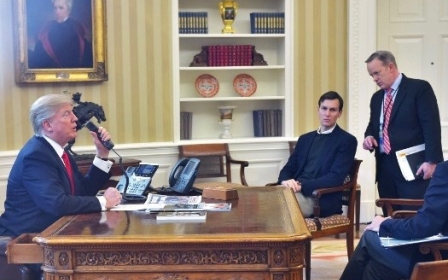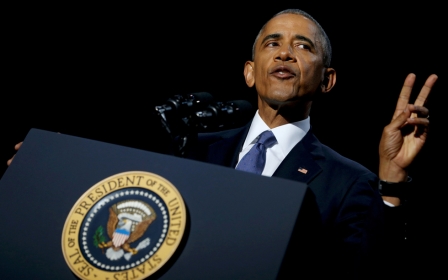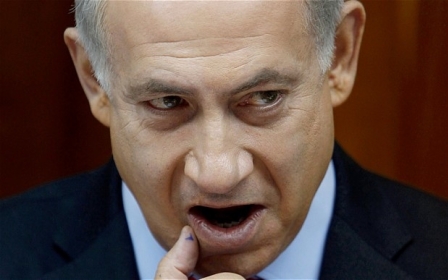Iran committed to nuclear deal despite Trump threats, say observers
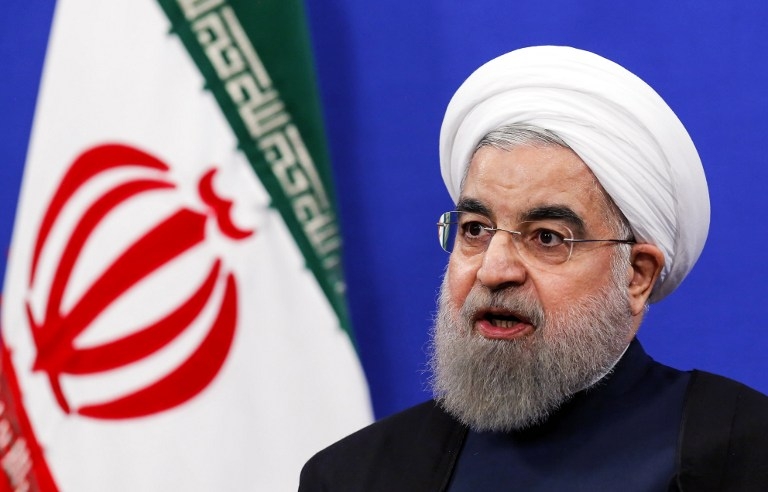
Despite tough talk by US President Donald Trump, Iran is still committed to the nuclear deal agreed in 2015, according to analysts at a conference on nuclear energy in the Middle East.
Former Iranian diplomat Seyed Hossein Mousavian, who is closely allied with Iranian President Hassan Rouhani and who served as spokesman for his country's nuclear negotiations with the European Union from 2003 to 2005, believes that Iran is keen to maintain the deal.
"Since day one, no one has been able to complain of any failure of Iran in implementing the deal," Mousavian told Middle East Eye at a mostly closed-door conference on nuclear challenges in the region at the American University of Beirut on 15 March.
As long as the US holds up its end of the bargain, particularly the lifting of nuclear-related sanctions, then "Iran would continue to be committed to the nuclear deal," he added.
Rouhani has said publicly that he doesn't believe the US administration can unilaterally tear up the deal, which was signed between several world powers and Iran.
In December, Rouhani said Trump "may wish to weaken or tear up Barjam," referring to the Persian acronym for the nuclear deal, "but will we and our nation allow such a thing? America cannot influence our path of strength and endurance."
As a presidential candidate, Trump criticized the deal and at one point pledged to throw it out. But since taking office, has not said how he plans to proceed. The other five partners to the agreement – Britain, France, Germany, China and Russia – support it.
Further US sanctions
Although Mousavian does not believe that the US is prepared to scrap the Iran nuclear deal outright, he expects Trump to impose further sanctions on Iran.
Mousavian told MEE: "They would let the deal go on, but they would try to undo practically the Iranian nuclear deal through many other sanctions under ... the umbrella of terrorism, missiles, human rights and regional issues.”
The Iran nuclear deal, negotiated under then-US president Barack Obama, required Iran to limit its nuclear programme, significantly reduce its stockpile of enriched uranium and submit to a rigorous inspection programme. In exchange, many of the international sanctions that had been imposed on Iran would be lifted.
'I think President Trump and his administration would not tear up the deal'
- Seyed Hossein Mousavian, former Iranian diplomat
In addition to imposing more non-nuclear sanctions, the US might also step up the inspections and verification process under the deal, said analysts.
Ali Ahmad is director of the energy and security in the Middle East program at the American University of Beirut's Issam Fares Institute for Public Policy and International Affairs, which convened the conference bringing together scientists and diplomats from around the Middle East. He told MEE that he anticipates the US administration might seek to "maximize inspection verifications and make them very vigorous".
But he went on to explain that "in principal ... if the Iranians are genuine about not having nuclear weapons ... [they] should have no problem if Trump imposed harsher inspections or verification."
At the same time, although the US's commitment to the deal has been unclear, the EU has maintained its support for the deal, giving Iran more reason to uphold its end of the bargain.
Following visits from European delegations to Iran earlier this month, Iranian foreign ministry spokesman Bahram Ghasemi said the EU has continued to improve its relations with Iran and its support for the nuclear deal.
According to Ghasemi, the EU states have not received any requests from the US to put pressure on Iran regarding the deal, also known as the Joint Comprehensive Plan of Action (JCPOA).
Uncertain future
Despite Iran's commitment to the deal, increasing economic pressure from Washington could provoke Iran into walking away, said Mousavian.
"I think that if through any sanctions the Trump administration would be able to deprive Iran from the economic benefits of the nuclear deal, then why should Iran be committed to the nuclear deal?" Mousavian, now a research scholar with Princeton University’s Program on Science and Global Security, told MEE.
The Trump administration last month slapped new sanctions on Iran in response to its continuing ballistic missile programme.
The sanctions, which applied to 25 individuals and companies connected to the ballistic missile programme and those providing support to Iran's Islamic Revolutionary Guard Corps' Qods Force, froze US assets and prohibited Americans from doing business with them.
Furthermore, the upcoming Iranian presidential elections in May, which pit Rouhani, a moderate who oversaw the signing of the nuclear deal, against a potentially more conservative field of challengers, could cast further uncertainty on the future of the agreement.
According to Frank von Hippel, a Princeton academic and former co-chair of International Panel on Fissile Materials: "The Iran deal was made possible by a coalition between doves in Washington and doves in Tehran.
“We now have a hawkish administration in Washington, and we'll know soon about the situation in Tehran," he said during the conference panel in Beirut last week.
Meanwhile, a spokesman for the US National Security Council (NSC) told MEE that the US "continues to uphold its commitments" under the deal while continuing to "review and closely monitor to see that Iran is meeting its commitments".
'We now have a hawkish administration in Washington and we’ll know soon about the situation in Tehran'
- Frank von Hippel, former co-chair of International Panel on Fissile Materials
The US administration "is undertaking a rigorous review process to determine the US position on the [Iran nuclear deal] moving forward," said the NSC spokesman.
In February, after a meeting between Trump and Israeli Prime Minister Benjamin Netanyahu, the White House issued a statement saying that "the two leaders agreed that the Iran nuclear deal is a terrible deal for the United States, Israel, and the world," but did not explain how the US plans to act on the deal going forward.
Riyadh and Washington strengthen ties
Washington also appears to be moving closer to Saudi Arabia, a regional rival of Iran that had opposed the nuclear deal. Trump received Saudi Deputy Crown Price Mohammed bin Salman at the White House on 14 March. The Saudi government hailed the meeting as a "historic turning point" in relations between the countries, which had chilled under Obama.
Iran is among the six Muslim-majority countries whose citizens would have been temporarily banned from traveling to the United States under an executive order issued by Trump and then blocked by a judge. Saudi Arabia was not on the list.
'The current political environment in the Middle East, the tension between Iran and the Arabs, is a challenge and it's not a good indicator of success for these ideas'
- Seyed Hossein Mousavian, former Iranian diplomat
Proposals to create a Middle East-wide nuclear-free zone have so far not gained traction. Such an agreement would require Israel, believed to be the only state in the Middle East with nuclear weapons, to give up its arsenal.
Mousavian suggested that the Iran nuclear deal could be taken as a blueprint for a smaller regional agreement between Iran and the Gulf countries to limit nuclear programmes to civilian uses and create a nuclear weapon free zone.
Ahmad said such a deal would be good for the security of the region, but that tensions between Iran and Saudi Arabia may preclude it in the near future.
"The current political environment in the Middle East, the tension between Iran and the Arabs, is a challenge and it's not a good indicator of success for these ideas," he said.
"My hope that these two countries can actually resolve their difference ... but even if some of the differences weren't completely resolved, I still hope the dialogue or the discussion on such topics could start regardless."
New MEE newsletter: Jerusalem Dispatch
Sign up to get the latest insights and analysis on Israel-Palestine, alongside Turkey Unpacked and other MEE newsletters
Middle East Eye delivers independent and unrivalled coverage and analysis of the Middle East, North Africa and beyond. To learn more about republishing this content and the associated fees, please fill out this form. More about MEE can be found here.


